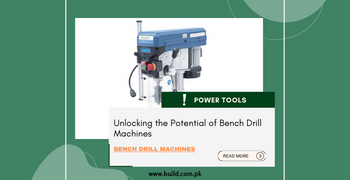Unlocking the Potential of Bench Drill Machines

Introduction:
In the realm of woodworking, metalworking, and
DIY projects, having the right tools can make al the difference. Among the
essential tools for precision drilling tasks is the bench drill machine.
Versatile, powerful, and precise, bench drill machines are indispensable for a
wide range of drilling applications. In this detailed guide, we'll explore
everything you need to know about bench drill machines, from their features and
benefits to tips for choosing the right model and maximizing its capabilities.
Understanding Bench Drill Machines
Bench drill machines,
also known as pillar drills or benchtop drill presses, are stationary tools
designed for drilling holes accurately and efficiently. These machines consist
of a sturdy base, a column (or pillar), a motor, and a drilling head that
houses the drill chuck and spindle. Here are some key features of bench drill
machines:
Adjustable Table:
Bench drill machines typically feature a
flat, adjustable table that can be raised, loered, tilted, or rotated to
accommodate various workpiece sizes and angles. This allows for precise
positioning and alignment during drilling operations.
Variable Speed Control:
Many bench drill machines come
equipped with variable speed settings, allowing users to adjust the drilling
speed to suit different materials and drill bit sizes. This feature enhances
versatility and precision when working with diverse materials such as wood,
metal, and plastics.
Depth Stop Mechanism:
To ensure consistent drilling depths
and precise hole depths, bench drill machines often incorporate a depth stop
mechanism. This feature allows users to set a specific drilling depth,
preventing over-drilling and ensuring uniformity across multiple workpieces.
Powerful Motor:
Bench drill machines are powered by electric
motors that provide the necessary torque and rotational force to drive drill
bits through various materials. Motors may vary in horsepower (HP) ratings,
with higher HP ratings indicating greater drilling power and capability.

Exploring the Benefits of Bench Drill Machines
The
versatility and precision offered by bench drill machines make them
indispensable tools for woodworking shops, metal fabrication facilities, and
DIY enthusiasts alike. Here are some key benefits of using bench drill machines:
Accurate Drilling:
With precise depth control, adjustable
tables, and stable drilling platforms, bech drill machines ensure accurate and
consistent hole placement, making them ideal for precision drilling tasks.
Versatile Applications:
From drilling holes in wood, metal,
and plastics to countersinking, reaming, and tapping operations, bench drill
machines offer versatility and flexibility for a wide range of applications.
Increased Productivity:
By automating drilling processes and
providing a stable platform for repetitive tasks, bench drill machines help
streamline workflow and increase productivity in professional workshops and
production environments.
Enhanced Safety:
Bench drill machines incorporate safety
features such as safety guards, emergency stop switches, and built-in overload
protection mechanisms to minimize the risk of accidents and injuries during
operation.
Choosing the Right Bench Drill Machine
When selecting a
bench drill machine for your workshop or project needs, consider the following
factors to ensure you make the right choice:
Size and Capacity:
Determine the size of the workpieces
you'll be drilling and choose a bench drill machine with an appropriate throat
depth, spindle travel, and table size to accommodate your requirements.
Motor Power:
Consider the horsepower (HP) rating of the bench
drill machine's motor, ensuring it provides sufficient power for the materials
and drilling tasks you'll be working with.
Speed Settings:
Look for a bench drill machine with variable
speed control options, alloing you to adjust the drilling speed to match the
material hardness, drill bit size, and desired hole diameter.
Build Quality and Durability:
Choose a bench drill machine
made from high-quality materials such as cast iron or steel, with sturdy
construction and precision engineering to ensure durability and long-term
reliability.
Maximizing Bench Drill Machine Performance
To get the most
out of your bench drill machine and achieve optimal results, consider the
following tips:
Secure Workpieces Properly: Always clamp or secure workpieces
firmly to the drill table using appropriate clamps or fixtures to prevent
movement or slippage during drilling operations.
Use Sharp Drill Bits: Ensure that drill bits are sharp,
properly sharpened, and suitable for the material being drilled to achieve clean,
accurate holes with minimal effort and strain on the machine.
Lubricate Moving Parts: Regularly lubricate the moving parts,
such as the spindle, chuck, and column, to reduce friction, prevent wear and
tear, and maintain smooth operation of the bench drill machine.
Perform Routine Maintenance: Periodically inspect and clean
the bench drill machine, checking for signs of wear, misalignment, or damage.
Follow the manufacturer's recommendations for lubrication, adjustment, and
servicing to keep the machine in optimal condition.
Conclusion:
Bench drill machines are indispensable tools for woodworking, metalworking, and DIY projects, offering precision, versatility, and efficiency for a wide range of drilling applications. By understanding their features, benefits, and capailities, as well as considering key factors when choosing a model, you can select the right bench drill machine to suit your needs and achieve professional-quality results in your workshop or project endeavors. Whether you're drilling holes in wood, metal, or other materials, a bench drill machine is sure to become an invaluable asset in your arsenal of tools.









